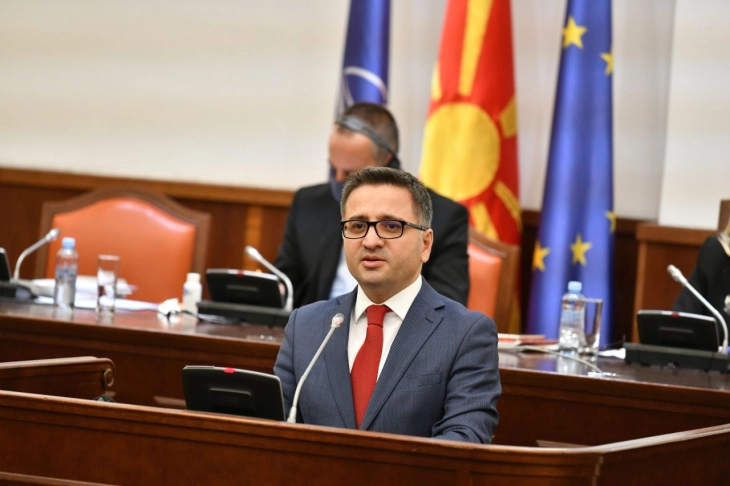Besimi: 2022 budget focuses on development, strong financial support for economic recovery, rapid growth

Skopje, 15 November 2021 (MIA) – 2022 will a year of further economic recovery and rapid growth through record investments, exceeding the budget deficit. Amid risks brought on by the COVID-19 pandemic, focus will be put on public health protection. Timely payment of salaries, pensions and social benefits is also a crucial part of the budget, Finance Minister Fatmir Besimi told the Finance and Budget Parliamentary Committee on Monday while presenting the 2022 draft-budget.
According to projections, total revenues in the draft-budget are 238.9 billion denars, 7.4% higher compared to 2021. Expenditures are projected at 272.4 billion denars, 1.4% up compared to this year. Deficit is projected at 33.5 billion denars (4.3% of GDP), 2.2 percentage points down compared to 2021 projections.
The 2022 draft-budget also projects capital investments standing at 37.8 billion denars, 27% more compared to 2021 and higher than the budget deficit.
Besimi told committee members that the budget focuses on development, as well as strong financial support for economic recovery and rapid, inclusive and sustainable development.
According to the Minister, money will only be borrowed for capital investments, while taxpayers’ money will be directed where it is most likely to achieve improved living qualities, in line with the “value for money” principle.
Funds will be allocated for intensifying realization of infrastructure projects, that is, investments in road and rail infrastructure, as well as capital investments aimed at improving the health, education and social systems, agriculture, culture, sports, environmental protection and the judiciary.
“In order to respond to the present challenges brought on by the COVID-19 pandemic, more funds have been projected for the health sector, standing at 7.4 billion denars for procurement of vaccines, reconstruction of public health facilities, buying medical equipments, restoration of vaccination points and other programs,” Besimi said.
Aside from higher capital investment funds, the draft-budget also entails activities aimed at providing better use of funds through strengthened monitoring within the mechanism for higher realization of capital expenditures, establishing indicators measuring the success of budget users and introducing an integrated information system for finance management and integrated tax information system.
“Budgeting mustn’t be seen as an isolated initiative, but as part of broader institutional reform, which aims to improve the quality of life of current and future generations,” underlined the Minister, adding that focus will be put in 2022 on capital investments and cutting expenditures.
Minister Besimi noted that timely payment of salaries, pensions and social benefits is also a crucial part of the 2022 budget.
Moreover, it remains committed to optimization of the administration by controlling new hirings, improving employees’ quality of life and increasing their motivation to perform work tasks in a professional manner. The budget also projects higher salaries for health workers, inspectors, judges and prosecutors, professional soldiers, IPA structure workers and forest police employees.
The Minister underlined more efficient use of resources through improved planning and realization of operative expenditures, cutting unproductive expenditures, such as travel expenses, etc., as well as introducing spending standards.
Social transfers are projected at 124.5 billion denars. 64.4 billion denars are intended for pensions, 11 billion denars for social protection benefits for vulnerable categories, 1.4 billion denars for the unemployed and 1.8 billion denars for active policies and employment measures.
The 2022 draft-budget also aims to improve the standard of students, by allocating more funds for meals and scholarships.
Moreover, the budget entails support for the private sector, aimed at rapid, inclusive and sustainable economic development. Funds have been projected for small and medium-sized enterprises, improving competitiveness, innovation, technological development and research, as well as new investments, support for export, conquering new markers, and creating new jobs.
Sectors that are most hard-hit by the COVID-19 pandemic will continue to receive support through subventions projected at some 4 billion denars.
In regard to green transition and improved management of climate and environmental challenges, a new green development program has been developed, set to provide 4 billion denars for reducing greenhouse gas emissions, improving the quality of water, air and soil, as well as using new, renewable sources of energy.
Support for the agriculture sector also resumes, through subsidies and IPARD funds, while municipalities will get more money through the reform for promotion of fiscal decentralization.
The Minister stressed that the main economic policies and reforms for rapid, sustainable and inclusive economic growth amid the COVID-19 pandemic and challenges brought on by the energy crisis remain committed to improving the conditions for a functional market economy, set to be competitive on the European market and beyond.
Rapid economic growth, projected at 4.6%, is expected in 2022. Gross investments are projected to rise by 8.5% while consumption by 3.1%. In addition, exports are expected to increase by 8.3%, with positive trends on the labor market through a 3.1-percent growth in the number of employees.
Moreover, the inflation rate is expected to stabilize and stand at 2.4% in 2022, while pressure on prices, generated by uncertainty in the energy sector and global stock markets, is expected to relax in Q2 2022.
“We’ve set an ambitious goal for 2022, but there’s solid ground for it to be achieved,” the Minister said, adding that the country remains committed to achieving priorities related to rapid economic growth, with special focus on health, fiscal consolidation, ongoing reforms, the judiciary and EU integration, the green agenda, digitalization, innovation and technological development, human capital development, infrastructure investments, social cohesion and strengthening the institutional capacities.







